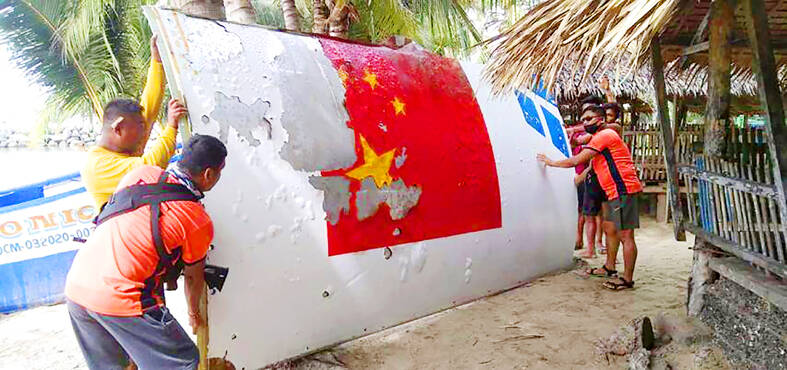The China Coast Guard forcibly seized apparent Chinese rocket debris that was being towed by the Philippine Navy, in the latest confrontation in the disputed South China Sea, a Philippine military commander said yesterday.
A Chinese vessel twice blocked a Philippine naval boat before seizing the debris it was towing on Sunday off Philippine-occupied Thitu Island (Jhongye Island, 中業島), Philippine Navy Vice Admiral Alberto Carlos said.
He said no one was injured in the incident.

Photo: AP
China denied there was a forcible seizure and said the debris, which it confirmed was from a Chinese rocket launch, was handed over by Philippine forces after a “friendly consultation.”
Thitu Island, which is also claimed by Taiwan and known in the Philippines as Pagasa, lies in the Spratly Islands (Nansha Islands, 南沙).
Chinese coast guard ships have blocked Philippine supply boats delivering supplies to Filipino forces in the disputed waters in the past, but seizing objects in the possession of another nation’s military constitutes a more brazen act.
Carlos said the Philippine sailors, using a long-range camera on Thitu Island, spotted the debris drifting near a sandbar about 540m offshore. They set out on a boat and retrieved the floating object and started to tow it back to the island.
As they were traveling back to the island, “they noticed that a China Coast Guard vessel with bow No. 5203 was approaching their location and subsequently blocked their pre-plotted course twice,” Carlos said in a statement.
The Chinese coast guard vessel then deployed an inflatable boat with personnel who “forcefully retrieved said floating object by cutting the towing line” attached to the Philippine sailors’ rubber boat, he said.

‘ABUSE OF POWER’: Lee Chun-yi allegedly used a Control Yuan vehicle to transport his dog to a pet grooming salon and take his wife to restaurants, media reports said Control Yuan Secretary-General Lee Chun-yi (李俊俋) resigned on Sunday night, admitting that he had misused a government vehicle, as reported by the media. Control Yuan Vice President Lee Hung-chun (李鴻鈞) yesterday apologized to the public over the issue. The watchdog body would follow up on similar accusations made by the Chinese Nationalist Party (KMT) and would investigate the alleged misuse of government vehicles by three other Control Yuan members: Su Li-chiung (蘇麗瓊), Lin Yu-jung (林郁容) and Wang Jung-chang (王榮璋), Lee Hung-chun said. Lee Chun-yi in a statement apologized for using a Control Yuan vehicle to transport his dog to a

Taiwan yesterday denied Chinese allegations that its military was behind a cyberattack on a technology company in Guangzhou, after city authorities issued warrants for 20 suspects. The Guangzhou Municipal Public Security Bureau earlier yesterday issued warrants for 20 people it identified as members of the Information, Communications and Electronic Force Command (ICEFCOM). The bureau alleged they were behind a May 20 cyberattack targeting the backend system of a self-service facility at the company. “ICEFCOM, under Taiwan’s ruling Democratic Progressive Party, directed the illegal attack,” the warrant says. The bureau placed a bounty of 10,000 yuan (US$1,392) on each of the 20 people named in

The High Court yesterday found a New Taipei City woman guilty of charges related to helping Beijing secure surrender agreements from military service members. Lee Huei-hsin (李慧馨) was sentenced to six years and eight months in prison for breaching the National Security Act (國家安全法), making illegal compacts with government employees and bribery, the court said. The verdict is final. Lee, the manager of a temple in the city’s Lujhou District (蘆洲), was accused of arranging for eight service members to make surrender pledges to the Chinese People’s Liberation Army in exchange for money, the court said. The pledges, which required them to provide identification

INDO-PACIFIC REGION: Royal Navy ships exercise the right of freedom of navigation, including in the Taiwan Strait and South China Sea, the UK’s Tony Radakin told a summit Freedom of navigation in the Indo-Pacific region is as important as it is in the English Channel, British Chief of the Defence Staff Admiral Tony Radakin said at a summit in Singapore on Saturday. The remark came as the British Royal Navy’s flagship aircraft carrier, the HMS Prince of Wales, is on an eight-month deployment to the Indo-Pacific region as head of an international carrier strike group. “Upholding the UN Convention on the Law of the Sea, and with it, the principles of the freedom of navigation, in this part of the world matters to us just as it matters in the